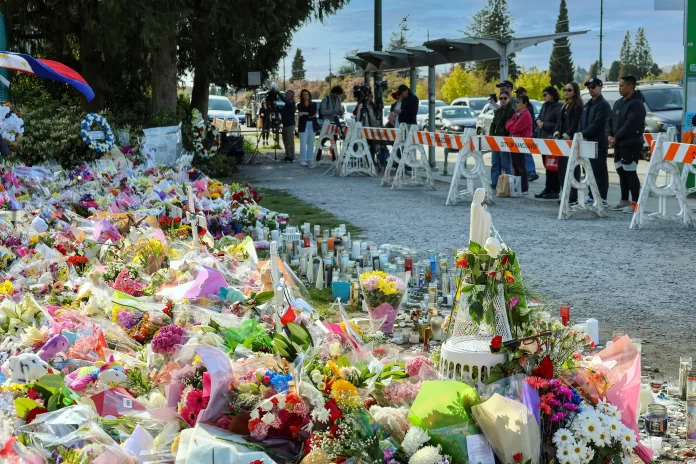Michael Batu is an associate professor of economics at the University of the Fraser Valley, and Adrian Bontuyan is an academic advisor.
In light of the tragic events that occurred on the evening of Apr. 26, Batu and Bantuyan opened up to The Cascade on the impact on the Filipino community.
Batu recalled that he was on his way to the Lapu-Lapu Festival in South Vancouver with his family. Leaving Abbotsford late, at around 3 p.m., his mother warned him about the dense traffic on Highway 1 — seeing the red lines on his maps app, Batu changed course.
Just two years earlier, in 2023, the provincial government declared Apr. 27 “Lapu-Lapu Day” to commemorate the Filipino hero and the Filipino diaspora in B.C.
“Lapu-Lapu Day is an opportunity to honour Lapu-Lapu as an inspirational Indigenous leader of the Philippines, to learn more about the history of British Columbians of Filipino heritage and to celebrate their contributions to the prosperity of this province.”
Lapu-Lapu fought against the Spanish colonial forces led by Portuguese explorer, Ferdinand Magellan, in 1521. Lapu-Lapu is a symbol of colonial resistance, showcasing the strength and independence of the Filipino people.
That Saturday, about 100,000 people flocked to the block of Fraser Street and 41st Avenue to gather and enjoy food trucks, a basketball tournament, community service booths, and cultural performances set to take place throughout the day. The event was attended by Premier David Eby, former NDP leader Jagmeet Singh, and notably, Black Eyed Peas members Apl.de.Ap and J. Rey Soul, who headlined the block party.
The day resulted in a mass casualty, taking the lives of 11 people from as young as five to 65 years of age, and dozens more were injured. The aftermath of this incident, described as a “car ramming,” has elicited responses from the Filipino community, the City of Vancouver, provincial, and federal governments.
Batu expressed that the people affected by the incident and the Filipino community are still coming to terms with the tragedy, feeling angry, and in denial. Batu said he took time to offer prayer at each of the markers for the deceased.
“Part of the processing on my part was to actually go there.”
Like Batu, Adrian Bontuyan has been channelling the impact of the tragedy into action. Bontuyan organized a vigil at UFV, which took place in the Yurt on May 2. Bontuyan was supported by his colleagues, and arranged for 11 roses and 11 candles to be displayed. About 20 people attended to offer silent prayers.
“Being able to organize that day of remembrance kind of helped me … People reached out individually, but when I saw people coming together and [being] supportive that made me feel like we’re all supported, right? We’re supporting each other,” said Bontuyan.
Vancouver Mayor Ken Sim and the Vancouver Police Department (VPD) presented a Lapu-Lapu safety review on May 16. Sim emphasized that action was necessary in light of the tragedy.
However, Batu, echoing the sentiments of many — including Bontuyan — cites that Canadian systems and institutions fail people by being reactive, rather than proactive.
“For far too long, our institutions have kicked the can down the road on this issue.”
Batu also criticized the inadequate public safety protocols. The City and VPD in tandem performed a risk assessment for the Lapu-Lapu Festival, which looked at a myriad of factors that may impact public safety, including whether the Filipino community faced any “known threats.”
Batu acknowledged that in Black and brown communities, festivals like these have high-risk assessments, and violence has become commonplace.
“So what worries me is what happened — what’s still happening — among our black brothers and sisters in other parts of this country, that this has become normalized. That should not be the case.”
Bontuyan expressed fear concerning events that could be held during the upcoming Filipino Heritage Month, which is celebrated annually in June.
“I have really mixed feelings about it. Do I go? … That’s part of the trauma; even though we’re not there, we’re all affected by it.”
Additionally, Bontuyan commented on the narrative shift that has taken place since the tragedy. He remarked on the stereotype of Filipinos as caregivers, and in the wake of Lapu-Lapu, he has seen Filipino people being made visible and cared for by the community in a new way.
“We’ve become visible in a way that — we have so many things to offer to this country beyond being a caregiver or a cleaner … It’s sad that it has to come to this point for us to be visible.”
Both Batu and Bontuyan remain hopeful that the Filipino community and Filipino students at UFV will continue to come together and stand strong as the ramifications of the incident continue to unfold.
Kiara Okonkwo is a writer and creative. She received a diploma in Screenwriting from Vancouver Film School and is pursuing her Bachelor of Fine Arts in Creative Writing and Media and Communication Studies. Kiara values self-expression and authenticity.


